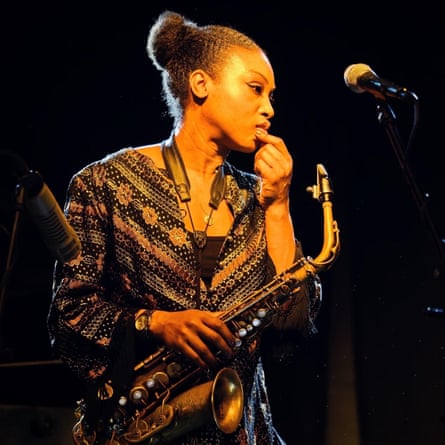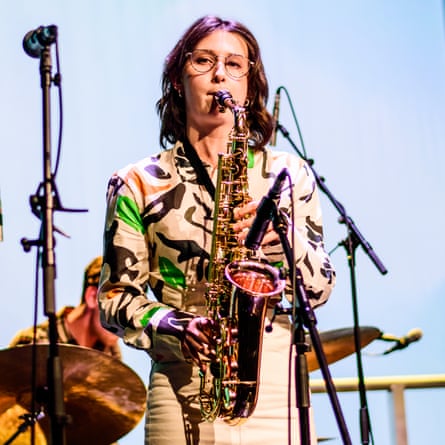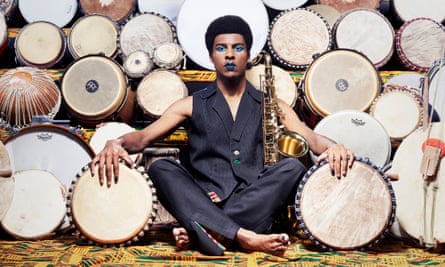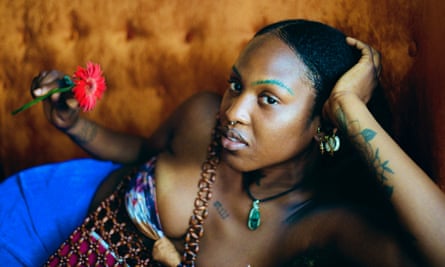For much of the last decade, improvised music in the UK has been carving out its own path. Interweaving everything from saxophonist Nubya Garcia’s breathless west African rhythms to Ezra Collective’s Afrobeat fanfares and tuba player Theon Cross’s dubby bass frequencies, a new generation of instrumentalists has been combining the music of their cultural heritages with an underlying jazz sensibility.
It is notoriously difficult, though, to make a living in the music industry, in particular with jazz. A 2008 study on the economics of jazz found that half of jazz musicians’ total income came from live performances. Not surprisingly, a 2020 survey – mid-pandemic – conducted by Encore Musicians revealed that 64% of musicians were considering leaving the profession. Today, with audiences still below pre-pandemic levels and the cost of living crisis producing new issues, we spoke to six up and coming artists about the opportunities and obstacles for those beginning a career in jazz.
‘I’m living the life I’ve always wanted’

In October 2019, drummer and composer Myele Manzanza moved across the world. “It felt as if I had reached the limit of what I could achieve back home in New Zealand, so I put my savings on the line and decided to come to London,” he says. “I had huge plans to finally become a full-time musician. Then Covid happened and everything was wiped out.”
Three years on, Manzanza is still here, sitting in the south London flat he shares with his partner, flanked by his practice drum kit, which is covered in mesh heads to dampen the sound for his neighbours. “These past few years have been the most creatively productive of my life,” he says. “Economically, we really had to tighten our belts, but I also realised that I’m happiest when I’m in the middle of a creative project, so I set myself the task of making a five-album series from the lockdown onwards.”
Aptly titled Crisis & Opportunity, the series has so far traversed free-flowing, hard-swinging explorations of the London jazz scene, as well as a forthcoming house-inflected offering on Volume Three. Drawing on his childhood absorbing the rhythms played by his father, a Congolese master percussionist, as well as his later experience touring with the Detroit house pioneer Theo Parrish, Manzanza’s music is rooted in an intuitive, thundering sense of groove.
“I’m so inspired – the amount of young talent coming out of London is ridiculous and it really keeps you on your toes,” he says. “In the past year, I’ve been able to actually cover my rent and bills with music. I’m not making mad money, but I’m able to be a full-time performing artist and live the musician’s life that I’ve always wanted.”
Even with the cost of living crisis hitting touring overheads and the price of flights, Manzanza is glad he moved. “It’s a concern that prices are going up and audiences might not want to pay as much for tickets, but I’m an optimistic guy,” he says with a smile. “Being a musician is never easy and there is always a level of precariousness, so I’m profoundly fortunate to be able to make music in the first place.”
‘I was mobbed at my Ronnie Scott’s gig’

In many ways, Camilla George exemplifies the diverse musical identity of the London jazz scene. She learned to play the saxophone as an 11-year-old, thanks to subsidised lessons at school, and went on to train in the grassroots jazz workshop Tomorrow’s Warriors, before playing in tutor Gary Crosby’s Jazz Jamaica group and creating improvised music inspired by her Nigerian heritage.
“Tomorrow’s Warriors created a safe space for kids from different backgrounds to learn together for free,” George says. “It brought together an unexpected mix of people, which has resulted in music that draws proudly on our own cultures. Not many people felt comfortable doing that before.”
Contemporaries on the London scene, such as Garcia and drummer Moses Boyd, have also been trained by Tomorrow’s Warriors and George can see the impact today. “When I was at music school at Trinity Laban, I was the only Black person and the only woman on my course,” she says. “Now, when I go to pick the strongest players for my band, often there are more women than men, and that’s testament to the fact that my contemporaries are showing kids that they can pick up an instrument and the Warriors are training them.”
Having just released her third album, the Afrobeat-inflected Ibio-Ibio, and with a forthcoming headline show during the London jazz festival, George’s star as a bandleader is beginning to ascend. “It feels as if there’s a real demand for this music now,” she says. “I was mobbed on my first gig back from Covid at Ronnie Scott’s, people were so excited. I’m really enjoying it, but I’m also finding it hard. We’ve had these two years where we got used to a different pace of life, so it is a bit of a culture shock to be back.”
With her calendar packed, George is looking forward to Christmas and the prospect of writing new material. “I’m going to retreat to my childhood bedroom,” she says. “All I’ll have is my keyboard and time to come up with something!”
‘I just want my records to be timeless’

Growing up on the outskirts of Glasgow, singer Georgia Cécile’s childhood was filled with music. “My dad’s one of nine kids and on weekends we’d get together with the entire family to sing and play,” she says. “My grandfather was a jazz piano player, my grandmother played the accordion and my aunt sang. We were encouraged to have our own party piece and I was always playing piano or trying to imitate a rich, warm tone like Billie Holiday.”
Cécile switched from studying law to music and immersed herself in the Scottish jazz scene, ultimately honing her voice to produce a husky, full-throated timbre. “I really developed my voice on the job, gigging all around town,” Cécile says in a video call from her Edinburgh home. “The Scottish scene is so small, it’s like a family, and I was taken under the wing of a lot of older musicians and allowed to experiment.”
The result is the 10 original compositions of her 2021 debut album, Only the Lover Sings. Flowing from the driving soul of Always Be Right to the Duke Ellington-style languorous swing of Harpoon and the orchestral balladry of Bittersweet, each track is anchored by Cécile’s soaring vocal. The subsequent release of the album, which was recorded between lockdowns, saw Cécile supporting Gregory Porter at the Royal Albert Hall and touring across the UK.
“We went from a stressful saga of cancelled shows to a rebirth of live music,” she says. “It felt like we’d all been in the dark and then we came together and the energy was so much bigger.” Yet, Cécile remains cautious. “I’ve been burnt out before and I have to be really careful how I schedule my gigs now to make sure there are more breaks,” she says. “I can’t sacrifice my health.”
For now, hibernation is in order as Cécile finishes the music for her next album, due next spring. “I just want my records to be timeless,” she says. “I want someone to pick one up in 20 or 30 years and feel that they can still connect to it. That’s what keeps me going.”
‘People said the album helped them through difficult times’

Jasmine Myra’s journey to find her sound has been an unpredictable one. Starting out with violin lessons at primary school in Leeds, Myra progressed to saxophone and high-school big bands, before studying jazz performance at Leeds Conservatoire. There, she was introduced to hip-hop and began playing in the Abstract Orchestra, covering tunes from the likes of J Dilla and MF Doom.
After a gig in 2019, Matthew Halsall, the trumpeter and head of Manchester jazz label Gondwana Records, approached her about a potential signing. “He could see how the hip-hop and jazz-influenced music that I was making might not be all there was to me,” Myra says from her home in Leeds. “Once we went into lockdown and I began writing my debut album, I went in a different direction entirely.”
That new direction comprises the eight, expansive tracks of Myra’s 2022 LP Horizons. Drawing on the enveloping warmth of contemporary jazz big bands, such as Kenny Wheeler’s Music for Large & Small Ensembles, and the freeform spiritual instrumentals made by Alice Coltrane, Myra produces dense compositions that unfurl effortlessly.
“The timing of it was fortunate because during lockdown I was doing a lot of work on my mental health and that has been really beneficial now my career has taken off and things have the potential to be overwhelming,” Myra says. “The pandemic was hard – I was on universal credit and working odd jobs – but it forced me to mature a lot.”
With tour costs increasing because of the rising price of petrol and promoters struggling to fill venues, it would not be hard to feel overwhelmed. But Myra is taking solace in the music. “It’s been very validating to get messages saying how the mood of the album has helped people get through difficult times,” she says. “That’s what it’s all for and it just pushes me on to write the next one.”
‘I’m trying to keep the torch alive’

“The mindset of this music is to always be learning and we do that through our community,” saxophonist Xhosa Cole says. “That is where we grow; that is the beacon of light for me.”
Cole caught the “jazz bug” at jams at the Spotted Dog pub in his native Birmingham, and through biking with his brother to watch local legend Andy Hamilton in the foyer of the city’s Symphony Hall, and his musicianship has been formed through community connections. He has gone on to become one of the most exciting young instrumentalists in the UK, winning the BBC Young Jazz Musician of the Year 2018 and having his dextrous, hard-blowing tenor sound featured with Soweto Kinch, as well as on his 2020 debut album, K(no)w Them, K(no)w Us.
“I was lucky to come up in a time where there was money and access for outreach projects,” he says from Birmingham, where he still lives. “It’s a completely different landscape for youngsters now – there’s far less funding and opportunities. I’m trying to keep that torch alive.”
Part of that impetus to keep the local scene thriving has included a weekly residency at Legacy Centre of Excellence that features a jam session for young players to hone their skills. “It’s a great learning experience because audience numbers can be quite volatile,” Cole says. “It trains you to play the same way to three people or 200. The live landscape might be changing post-Covid, but it’s still a blessing to be together in a space.”
The ultimate expression of that community connection comes on Cole’s forthcoming second album, Ibeji. Featuring sax and percussion duets with seven different percussionists, its sparse, rhythmically charged sound leaves no room for hiding. “This project marks the transition from isolation into connection,” he says. “It’s the manifestation of an intense collaboration – what I’ve always been trying to communicate.”
‘I’m sofa-surfing so I can’t bring my harp with me’

Davina Adeosun-Bright, AKA Muva of Earth, is sitting on a friend’s sofa, clutching a hot-water bottle to her chest. “I’m in between flats right now because it’s crazy trying to get a rental agreement in London,” she says. “I’m sofa-surfing, which means I can’t bring my harp with me.”
That harp is sitting in a rehearsal room across London, ready to record on Adeosun-Bright’s forthcoming debut EP. With only four singles to her name, she has already created an impressive buzz around her sound. Part-Erykah Badu neo-soul spiritualism, part-Alice Coltrane harp experimentalism, tied together by her powerful mezzo-soprano voice, it has resulted in her signing to Gilles Peterson’s label, Brownswood Recordings.
Things were beginning to take off pre-pandemic, and her debut headline show was in February 2019, but the lockdowns created a forced pause. “I was working so many jobs and trying to start my music career, Covid actually gave me the time to create,” she says. “It was really tough financially, but my community helped by crowdfunding a laptop to make my first tunes with. Nothing was going on, but I felt so inspired.”
Adeosun-Bright began training her voice from the age of 13, but only started learning the harp a year ago at 21, thanks to successful grant funding. “I always envisaged a meditative sound for my music and the harp was a dream,” she says. Although, we can expect a transformed sound on her forthcoming record. “I’m calling it Afropunk jazz, an expression of my truth as a woman of African descent, with jazz inflections,” she says. “I’m excited to share my vulnerability with the world and to finally start my life as an artist.”

Comments (…)
Sign in or create your Guardian account to join the discussion